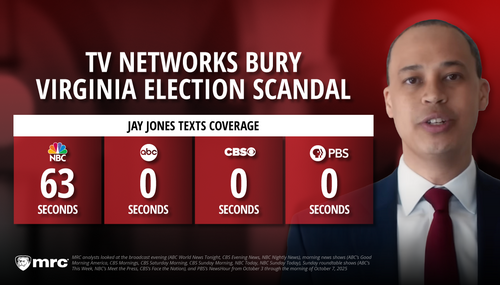New York Times media columnist Jim Rutenberg – best known for arguing on the front page that the media was facing a “Murrow moment” to put Donald Trump on the ash heap of history – continued on this quest by trashing Larry King and Ed Schultz as Russian propaganda tools and “Manchurian anchors” on Monday.
The headline was "Old Hands Help Russia Navigate U.S. Media." Rutenberg proclaimed:
But wittingly or not, Mr. Schultz and Mr. King are playing the equestrians to Russia’s Trojan horse (or, as The Daily Beast called them in an article last week, “Manchurian anchors”).
“Their strategy is very clear: to create the appearance of being a legitimate source of news,” Michael McFaul, a senior fellow at the Hoover Institution and a former United States ambassador to Russia, said of RT. “Having people like Larry King work for them helps them achieve their objective.”
Rutenberg concluded with another tool-of-Putin slam: “You can call RT America whatever you want — a news network, a propaganda arm, something in between. Regardless, it’s Mr. Putin’s. Despite their protests, it sure looks like Larry King and Ed Schultz are, too.”
The sudden media distaste for "state television" on American screens coincided with Donald Trump's interview with Larry King on September 9.
Now is this how The New York Times approached al-Jazeera America, as a propaganda invasion by the Emir of Kuwait, the brand that blithely forwarded Osama bin Laden communiques? Not exactly. Back in February, they allowed Hussein Ibish to mourn the channel’s decline:
WASHINGTON — The closing of Al Jazeera America, expected in April, is a sad conclusion to a project that was by turns uplifting and inspiring as well as troubling and depressing. Its demise offers a lesson in both the limitations of public diplomacy and the obstacles to providing high-quality television journalism.
Al Jazeera America was the latest, and perhaps most ambitious, branch of a media empire that the tiny but wealthy Gulf emirate of Qatar has used to project its influence, first regionally and then globally. The American-specific incarnation, begun in 2013, was partly an effort to rebrand for the United States the earlier iterations of the franchise, Al Jazeera Arabic and Al Jazeera English. But the American network was hobbled from the start by this very legacy.
The poor channel – and its hired American hands – were “hobbled” by the legacy of a foreign owner trying to navigate U.S. media with a propaganda message. How sad.
Let’s act surprised: The New York Times dislikes and disparages foreign propaganda when it seems pro-Trump, and less so when it seems pro-Islamist.
There are some entertaining passages in this Rutenberg crusade. King and his pals profess a degree of journalistic or business separation from RT, since the Russians buy the show from Ora:
Mr. King differentiated himself from Mr. Schultz, who works directly for RT and, Mr. King said, has recently seemed supportive of Mr. Trump — “a completely different Ed Schultz to me, which was a shock to me.”
An earlier version of this attack in Politico underlined that King was his usual servile self at the 10th anniversary dinner for RT in Moscow, at which Putin was present and he appeared remotely: “In his trademark shirtsleeves and suspenders, King apologized for his absence and let Putin know he’d love to interview him. The Russian leader looked visibly pleased.”
King's like that with Trump. King's like that with Bill Clinton. Rutenberg added:
Mr. Schultz generally supported Democrats during his time on MSNBC [this is like writing “Mr. Olbermann generally opposed Bush during his time on MSNBC”], which let him go in 2015, and said he did not support Mr. Trump, the presumed Putin favorite. The difference now, he told me on Friday, is that he is the anchor of a straight news program, which makes him seem kinder to Mr. Trump than he would be as an opinion host.,,,
A passionate defender of RT America, Mr. Schultz likened RT to the BBC, which receives some [?] government funding, in an interview with The Washington Post last week.
Yet the BBC, operating in the wildly free press environment of Britain, has regularly angered prime ministers and members of the government.
This shows Schultz knows how to argue with liberals, who think the BBC is the absolute center of socialist-media prestige. The BBC is overwhelmingly funded by a "licence fee" or a tax on televisions, and then parliamentary grants for the BBC World Service. Nobody thinks it's Theresa May's Channel, but that doesn't mean its state backing doesn't help it sound statist.




